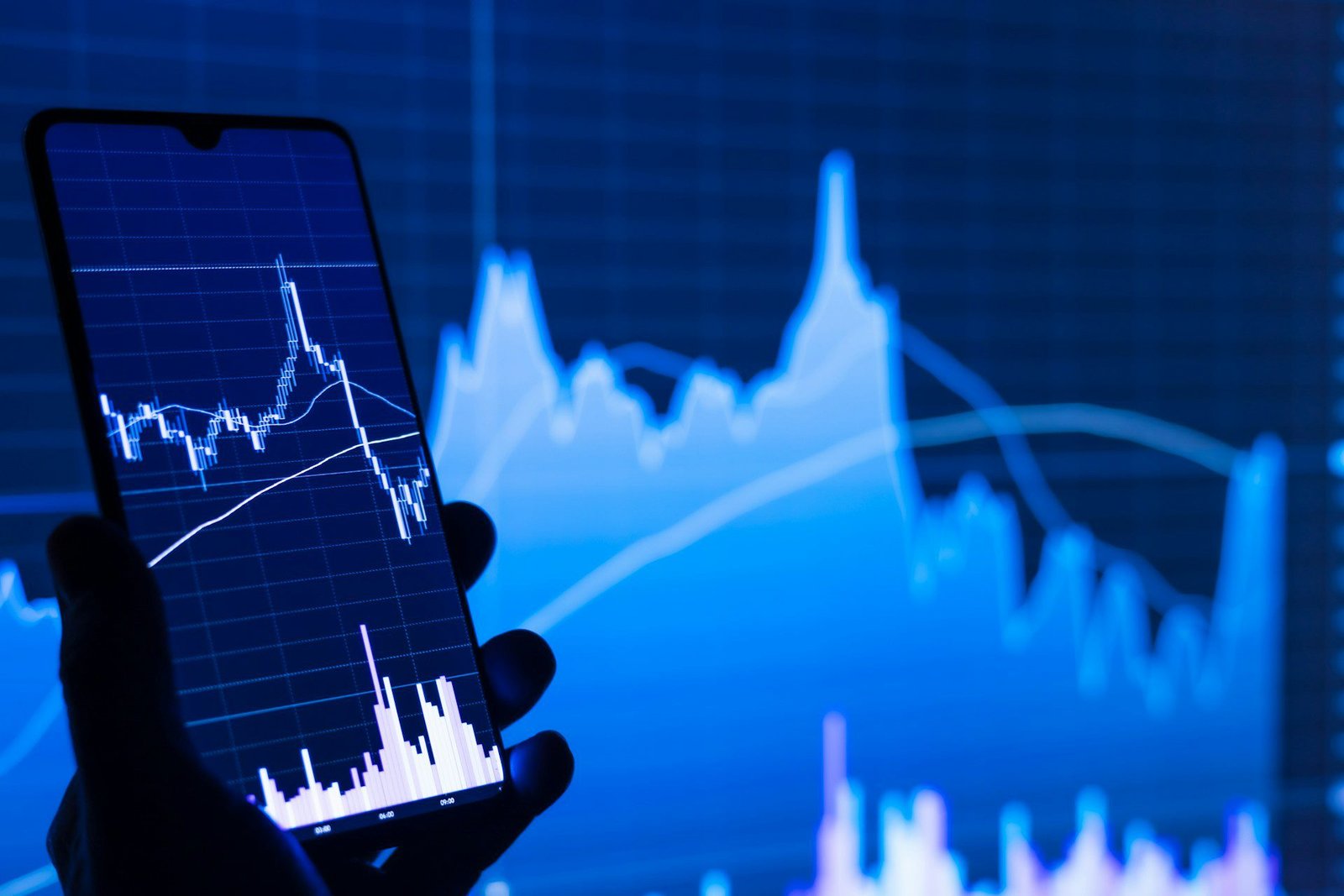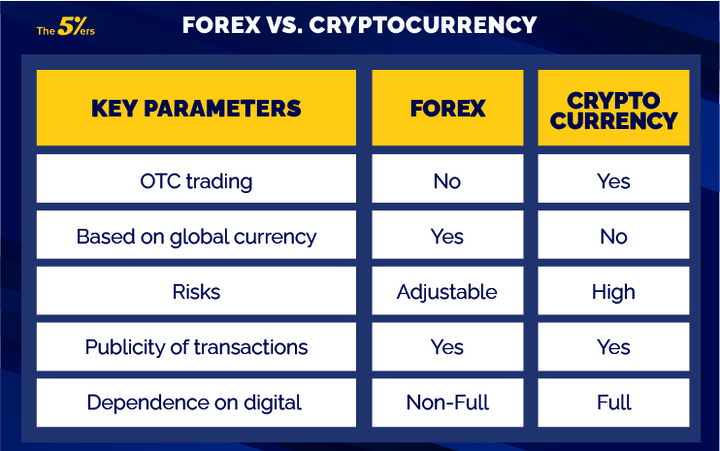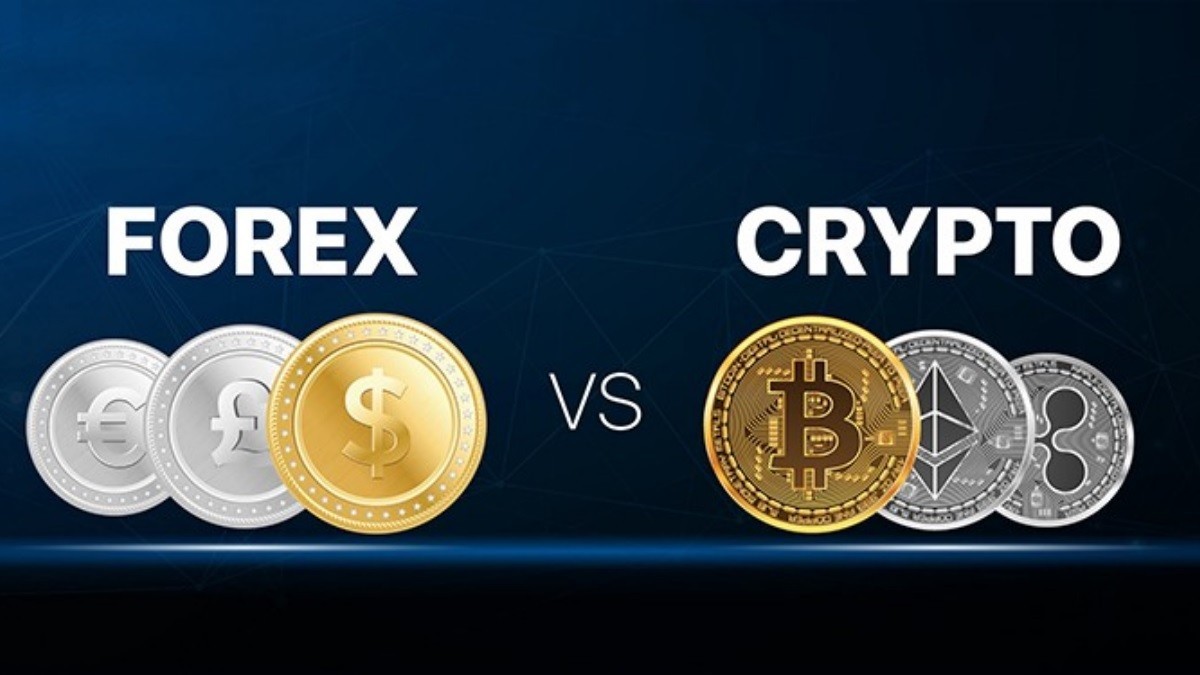What are the Differences between Forex And Cryptocurrency Trading? Explained
Forex trading involves exchanging national currencies, while cryptocurrency trading deals with digital or virtual currencies. Both markets offer high

Forex trading involves exchanging national currencies, while cryptocurrency trading deals with digital or virtual currencies. Both markets offer high liquidity and volatility but differ in regulation and market structure.
Forex trading has been around for decades, involving traditional currency pairs like USD/EUR. It’s highly regulated, providing a sense of security for traders. Cryptocurrency trading, on the other hand, is relatively new and involves digital currencies like Bitcoin and Ethereum.
This market operates 24/7, unlike Forex, which has specific trading hours. Cryptocurrencies are less regulated, leading to higher volatility and potential risk. Understanding these differences can help traders choose the market that best suits their investment strategies and risk tolerance.
Market Fundamentals
Understanding the market fundamentals helps traders make informed decisions. Both Forex and Cryptocurrency trading have unique characteristics. Below, we explore key differences in the nature of assets and market hours.
Nature Of Assets
Forex trading involves the exchange of traditional currencies. These include USD, EUR, JPY, and others. Traders profit from currency value fluctuations.
Cryptocurrency trading involves digital assets. Popular cryptocurrencies include Bitcoin, Ethereum, and Litecoin. These digital currencies use blockchain technology.
| Forex | Cryptocurrency |
|---|---|
| Physical currencies like USD, EUR | Digital currencies like Bitcoin, Ethereum |
| Regulated by central banks | Decentralized, no central authority |
Market Hours
The Forex market operates 24 hours a day, five days a week. It opens on Sunday evening and closes on Friday evening.
The Cryptocurrency market never closes. It operates 24/7, including weekends and holidays.
- Forex: 24/5 trading
- Cryptocurrency: 24/7 trading
Trading Platforms
Understanding the differences between Forex and Cryptocurrency trading is crucial for traders. One key difference is the trading platforms used. Forex and Crypto markets have unique platforms with specific features. Let’s explore these platforms in detail.
Forex Platforms
Forex trading platforms are designed for currency trading. They offer tools for market analysis, trade execution, and account management. Popular Forex platforms include MetaTrader 4 (MT4) and MetaTrader 5 (MT5). These platforms provide advanced charting tools, technical indicators, and automated trading options.
Forex platforms support various order types like market orders, limit orders, and stop-loss orders. They also offer real-time market data and news feeds. Most Forex brokers provide these platforms for free.
Here’s a quick comparison of common Forex platforms:
| Platform | Features |
|---|---|
| MetaTrader 4 (MT4) | Advanced charting, technical analysis, automated trading |
| MetaTrader 5 (MT5) | More order types, economic calendar, improved interface |
Crypto Exchanges
Crypto trading occurs on crypto exchanges. These platforms allow buying, selling, and exchanging cryptocurrencies. Examples include Binance, Coinbase, and Kraken. Crypto exchanges offer a wide range of digital assets and trading pairs.
Crypto exchanges provide features like wallet services, staking, and lending. They also support various order types, similar to Forex platforms. Security is a major concern, so most exchanges offer two-factor authentication and other security measures.
Here’s a brief look at popular crypto exchanges:
| Exchange | Features |
|---|---|
| Binance | Wide range of coins, low fees, advanced trading options |
| Coinbase | User-friendly, strong security, educational resources |
| Kraken | High liquidity, margin trading, staking options |
Both Forex and Crypto platforms have their unique strengths. Choosing the right platform depends on your trading needs and preferences.
Regulation And Security
Knowing the differences between Forex and Cryptocurrency trading can help traders make informed decisions. One crucial area of difference is regulation and security. This section explores how these two markets differ in these aspects.
Regulatory Environment
The Forex market is highly regulated. Various national authorities oversee it. Examples include the SEC in the USA and the FCA in the UK. These regulatory bodies enforce rules to protect traders and ensure market integrity.
In contrast, the Cryptocurrency market lacks consistent regulation. Some countries have strict laws, while others have none. This lack of uniform regulation can lead to higher risks.
Below is a table summarizing the regulatory differences:
| Aspect | Forex Trading | Cryptocurrency Trading |
|---|---|---|
| Regulation | Highly regulated | Varies by country |
| Regulatory Bodies | SEC, FCA, etc. | Few or none |
| Market Integrity | Ensured by regulations | Not consistently ensured |
Security Concerns
Security is a major concern in both markets, but the challenges differ. In the Forex market, regulated brokers must follow strict security protocols.
This includes segregating client funds and using secure trading platforms. In the Cryptocurrency market, security is a significant issue.
Many exchanges have been hacked, leading to significant losses. Traders must use secure wallets and enable two-factor authentication.
Below are some security tips for both markets:
- Use regulated brokers for Forex trading.
- Enable two-factor authentication for cryptocurrency accounts.
- Store cryptocurrencies in secure wallets.
- Regularly update passwords and security settings.

Volatility And Risk
Understanding the volatility and risk involved in trading is crucial for any investor. Forex and cryptocurrency markets both offer unique challenges and opportunities. This section dives into the specifics of these aspects.
Price Fluctuations
Both forex and cryptocurrency markets are known for their price movements. These fluctuations can offer high profits but also pose significant risks.
- Forex Market: The forex market is influenced by global events and economic indicators. Currency pairs can show stable trends but also sudden changes.
- Cryptocurrency Market: Cryptocurrencies are more volatile. Their prices can change drastically within minutes. This makes them high-risk but potentially high-reward investments.
Risk Management
Effective risk management strategies are vital in both markets. These strategies help traders minimize losses and protect profits.
| Forex Risk Management | Cryptocurrency Risk Management |
|---|---|
| Use stop-loss orders to limit potential losses. | Implement stop-loss levels to protect investments. |
| Leverage is available but can increase risk. | Avoid high leverage to reduce exposure. |
| Monitor economic news to anticipate market moves. | Stay updated with market news and trends. |
Both markets require a disciplined approach. Traders must always stay informed and cautious.
Liquidity And Volume
Understanding liquidity and volume is crucial for traders. These factors impact your trading strategy. Let’s explore the differences between Forex and Cryptocurrency Trading in terms of liquidity and volume.
Market Liquidity
Market liquidity measures how easily assets convert to cash. In Forex trading, liquidity is high. Major currencies like USD, EUR, and JPY trade easily. This ensures quick transactions and stable prices.
In cryptocurrency trading, liquidity varies. Major cryptocurrencies like Bitcoin and Ethereum have high liquidity. Smaller cryptocurrencies may face liquidity issues. This can lead to price volatility and slow transactions.
Trading Volume
Trading volume indicates the number of assets traded in a period. In Forex, trading volume is immense. The market trades $6.6 trillion daily. This high volume means you can enter and exit trades easily.
Cryptocurrency trading volume is smaller. Bitcoin trades around $50 billion daily. Lower volume can lead to price swings. This affects smaller cryptocurrencies more, causing higher volatility.
| Aspect | Forex | Cryptocurrency |
|---|---|---|
| Market Liquidity | High | Varies |
| Trading Volume | High | Lower |
- Forex markets have high liquidity and volume.
- Cryptocurrency markets have variable liquidity.
- High trading volume in Forex ensures quick transactions.
- Lower trading volume in crypto can cause price swings.
- Check liquidity before trading any asset.
- Look at trading volume for better trade execution.

Frequently Asked Questions
Is It Better To Trade Crypto Or Forex?
Trading crypto or forex depends on your risk tolerance and market knowledge. Crypto offers high volatility, while forex is more stable.
What Is The Meaning Of Crypto And Forex Trading?
Crypto trading involves buying and selling cryptocurrencies like Bitcoin. Forex trading focuses on exchanging foreign currencies for profit. Both require market analysis and strategies.
What Is The Best Platform To Trade Forex?
The best platform to trade forex is MetaTrader 4. It offers advanced charting, automated trading, and a user-friendly interface.
Is Forex Trading Better Than Stocks?
Forex trading and stock trading have their own benefits and risks. Forex offers higher liquidity and operates 24/7, while stocks provide ownership in companies. The better option depends on individual goals and risk tolerance.
Conclusion
Understanding the differences between Forex and cryptocurrency trading can guide your investment decisions. Forex offers stability and liquidity, while cryptocurrency provides high volatility and potential gains. Both markets have unique risks and rewards. Choose the one that aligns with your financial goals and risk tolerance.
Always stay informed and trade wisely.













